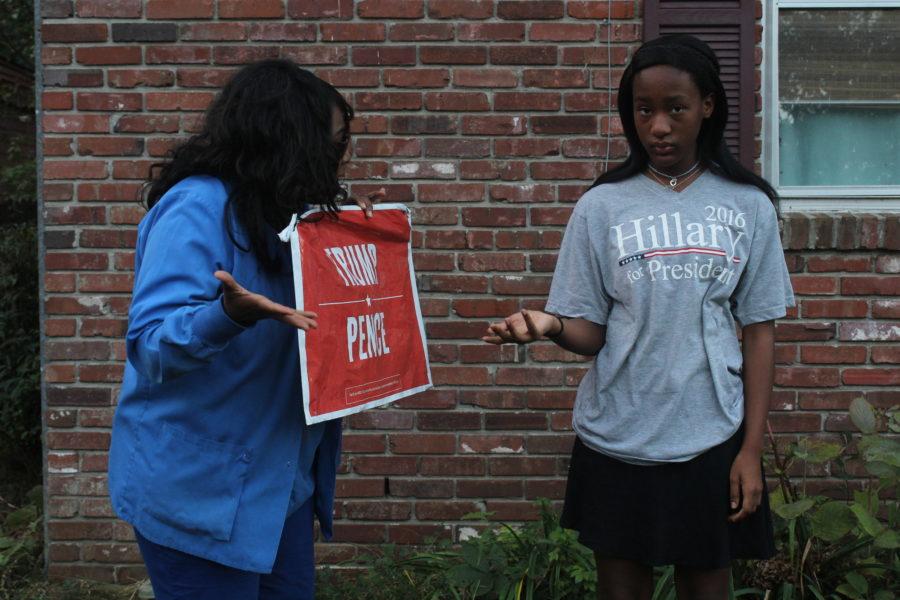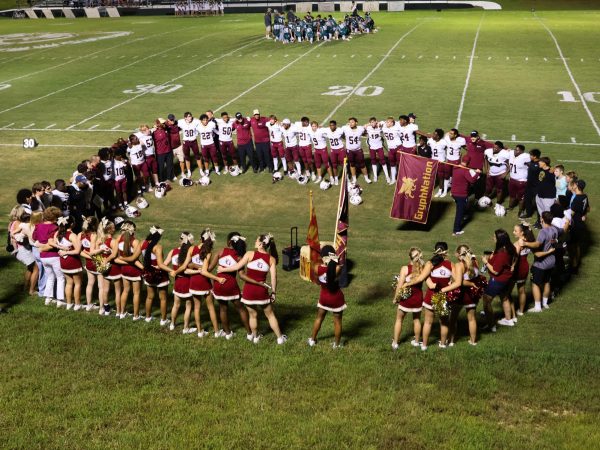Family feuds
Political views can divide or unite a family
Photo: Faith Huff
Eighth-grader Joy Huff and her mother act out their disagreement regarding the current election cycle. For generations, young people have been more likely to share the beliefs of their parents than disagree.
With the 2016 election fast approaching, politics have been coming to the dinner table all around the nation.
“I talk with my family about politics every once and awhile,” junior Fe Novoa said. “Since my brother and I have different opinions, we would fight a lot, so now the conversation has been banned from the dinner table.”
As America is left with two presidential candidates with historically high negative ratings, healthy political debate is harder to find now than in the past. Tensions around the topic of the election have increased so much that few students were willing to talk about politics for this article. More than 15 students refused to be interviewed. Experts say that the relationship between the parent and child is crucial in relation to politics.
“The biggest factor of political socialization, which is how one acquires their beliefs, is the family because parents have influence over you in your developmental years since there’s a bond, and you want your family to love and approve of you,” Ms. Emily Gunther, who teaches AP United States Government and Politics, said.
As predicted by Ms. Gunther, many students agree with their parents on political issues.
“My political opinions match my parents’ opinions,” sophomore Annie Bran said. “Although I don’t think of myself as someone who just goes with whatever their parents say, I actually think my parents are smart and know what they are talking about. Sometimes I disagree, but for the most part, my beliefs are based off of theirs.”
A factor that can influence these political beliefs is religion. In some cases, it can be used to unify a family’s mindset.“My ideology tends to follow my parents,” senior Becca Chandler said. “I don’t think that they intentionally formed them, but they are very religious and did encourage me to participate in religion as well, which ended up shaping my political beliefs.”
On the other hand, religion can also leave a family divided. Novoa sometimes finds herself disagreeing with the political views of her family members whose Christian views inform their opinions.
“When we disagree, there’s usually a lot of yelling. I’ll say my point and why I think it’s correct, and then my mom will usually disagree because of religious reasoning,” Novoa said.
“It makes it difficult to argue with her about politics because it’s a topic that people have opinions on depending on their religion.”
One way to reduce tension, whether you are discussing politics with parents or peers, is to learn how to appropriately tackle the topic. Students like senior Paige Marotta believe that education is key, as well as always addressing the topic rather than attacking the person.
“I think that people should educate themselves before they go and take a stand either way,” Marotta said.
Another way to help diffuse the situation is to become aware of what influences political opinions.
“Last week in AP government, we discussed how the main influences of political beliefs are parents, peers, school and media,” Chandler said. “I think media is definitely playing a larger role with our generation than it ever has before.”
Understanding where our peers’ political views come from helps to restore respect in political discussions. Acknowledging that these opinions are formed from countless interactions and information helps one to realize the complexity of humans and their ideas.
“I think political discussion should be more open and common than how people perceive it today,” sophomore William Wilson said. “Now, it is currently deemed socially unacceptable to talk about.”











